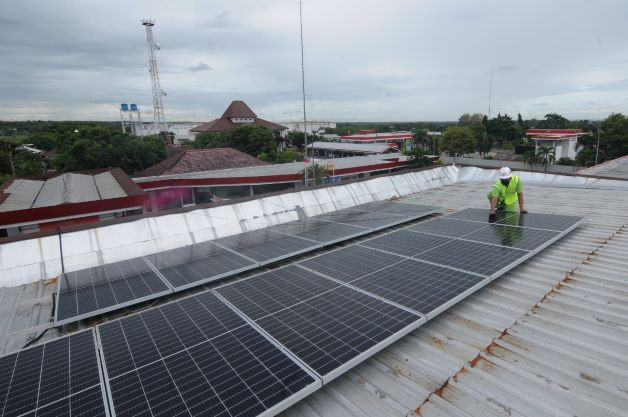Popular Reads
Top Results
Can't find what you're looking for?
View all search resultsPopular Reads
Top Results
Can't find what you're looking for?
View all search resultsWe have power to spare
Critics argue that Indonesia should keep all renewable energy (RE) within the country to support domestic industries rather than export it.
Change text size
Gift Premium Articles
to Anyone
 Saving energy: A worker cleans solar panels that generate electricity for a gas refueling station on Oct. 26, 2022, in the Teras area of the Central Java regency of Boyolali. Renewable energy helps the gas station operator save 10-15 percent on its monthly electricity bill. (Antara/Aloysuis Jarot Nugroho)
Saving energy: A worker cleans solar panels that generate electricity for a gas refueling station on Oct. 26, 2022, in the Teras area of the Central Java regency of Boyolali. Renewable energy helps the gas station operator save 10-15 percent on its monthly electricity bill. (Antara/Aloysuis Jarot Nugroho)
A
fter a long period without much progress, it now looks as though Indonesia is ready to move forward with plans to export solar power to neighboring Singapore.
Earlier this month, Energy and Mineral Resources Minister Arifin Tasrif signed a memorandum of understanding (MoU) with Singapore's Second Minister for Trade and Industry Tan See Leng on the export of renewably sourced electricity from Indonesia to Singapore.
According to the agreement, Indonesian state-owned electricity company PLN will work with private parties to facilitate power transmission. This sort of arrangement might require lengthy negotiations and approval procedures.
Nevertheless, this is a highly encouraging first step considering the opposition to clean power exports that exist within Indonesia. Critics argue that Indonesia should keep all renewable energy (RE) within the country to support domestic industries rather than export it.
This reasoning is not particularly convincing seeing as domestic demand for electricity generated from renewable sources is not strong, meaning investments also lag. The latest developments indicate that those favoring RE power exports have gained the upper hand.
PLN has not been supportive of solar power in the past, according to industry sources, some of whom have complained that the state-owned utility company’s rules discouraged households from installing photovoltaic (PV) panels on their roofs and feeding excess power to the grid.
Be that as it may, it is hard to see why PLN would oppose the export of clean power, or electricity from any source, given the power supply glut in Java and other regions of the country.
A glance at the map shows why Singapore is an obvious customer for Indonesian electricity. The city-state has limited ability to source RE power domestically and at affordable costs, and just a narrow stretch of water separates it from Batam. ASEAN plans for integrated power grids could open new markets in the future.
Indonesia has exploited only a miniscule portion of its tremendous RE sources. The country could add more than 100 gigawatt-peak of economically viable rooftop capacity for solar power using residential buildings alone, according to the Institute for Essential Services Reform (IESR).
Furthermore, geothermal power could be further tapped considering that contains around 40 percent of the entire world’s geothermal resources. However, not all that capacity is readily accessible, and there have been environmental concerns about geothermal projects in remote regions. Nevertheless, installed capacity could still be vastly increased from the current level while taking ecosystem preservation into account.
With so much RE potential, how could Indonesia possibly not have enough to share?
We are not taking advantage of that potential and one reason for the lack of investment is that we already have more than enough electricity, mostly produced from coal, while feed-in tariffs for independent power producers offering clean alternatives are too low.
Simply put, to make room for renewables in the market, coal must go.
The country is reportedly working on that front, but such a transition will not occur overnight. In the meantime, exporting electricity could provide exactly what is needed for green power: a market.
A large domestic or foreign market could turbocharge Indonesia’s solar power industry, and by extension the manufacturing of PV panels, which the government is keen to move onshore. Local content requirements have kept domestically produced panels from being competitive, but a boost in solar power demand from the export market would alter the economics in favor of local PV producers.
The RE power export market would provide the demand and manufacturing scale the domestic market needs, which will come in handy when we are finally ready to switch off some of the coal-fired power plants.










